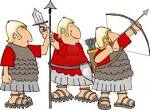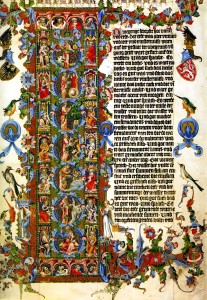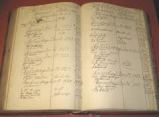Deborah and Jael – a Biblical retelling
(A CANAANITE PERSPECTIVE)
A rainy day in Canaan. Two charioteers of King Jabin’s army enjoy a couple of beers in a local pub. One of the men has just returned from battle and relates his tale to his comrade.
“Once again we had to deal with those bloody Hebrews and their new-fangled god. One god to take care of that lot; how’s that even possible. Everybody knows they breed like rabbits and live for donkeys years. We never seem to learn do we? What with their disrespect and unwillingness to integrate and accept our gods and traditions, we continue to take them under our wing and instruct them in the ways of the true faith. It’s like banging your head off a pyramid for all the good it does. There’s no helping some tribes – there really isn’t!”
The comrade nods – the charioteer continues.
“Rebellion seems to be the curse of their nation. Never trust a Hebrew that’s what I say. Look where it gets you. Nowhere that’s where! Though we allow them to enjoy our lands and to partake of our culture, imbibing them with the wisdom of modernity, and allowing them to move freely amongst us, they just can’t help themselves. More blood is spilt because of one god than any other reason I can think of. In fact, I would go as far to say that every war we fight is about religion.
The comrade nods sagely.
“A more deceitful, warlike, blood lusted, people has never before inhabited these lands. I swear to you, that so long as the Hebrew and their God persists in these provinces there will never be peace. Never – not till the end of time!”
The comrade looks up briefly, ogles a bar wench, and then goes back to his beer.
“There we were servicing those new metal chariots – which by the way seem to be far more problematic than the old wooden ones we had – when out of the blue we were surprised by a band of Hebrew insurgents. There was probably a couple of hundred of them at most, but given the condition of our equipment and the suddenness of their ambush we were forced to flee. Gave a good account of ourselves though. I tell you comrade, that after the battle the plain, although soaked in our own blood, was steeped in theirs. They won’t be back in a hurry. They claim to be freedom fighters, but anyone who turns on their adopted nation and kills their brothers is little more than a terrorist in my scroll. Crucifying is too good for them if you ask me.
The comrade as though in pain, grimaces agreement.
“A vagabond group led by some she-devil called Debbie, and a half breed by the name of Barak. Why they let women into the service I’ll never know. It will be the ruin of the Army, mark my words. They were a motley bunch, I tell you, little more than land-pirates out to feather their own nests at the expense of hard working, law abiding, gods fearing Canaanites.”
The charioteer continues.
“Anway, discretion being the better part of valor we withdrew up by Mount Tabor to regroup. They’ll be sorry the next time we meet. Accompanied by our idols, soothsayers, and true gods we’ll give ‘em hell. Bit of a blot on the old copy-book though as we left a couple of the boys on the field, and you know that’s a bit of a no-no. Not good for the old esprit de corps to leave the wounded behind. In our haste old Sissera sprung a puncture, fell out of his chariot, and was captured by the blaggards.”
The comrade looks up mildly interested, belches and goes back to his beer.
“Taken prisoner he was, but given their professed Christian values we expected there would soon be a parley and an exchange. Little did we know that it would be the hand of a woman that did it for him. Tricked and lured by some witch called Jael he was. As I heard it he was sleeping in a tent when the old woman sneaks in while he’s sleeping, and sticks him in the head with a spike. Bloody murder that is! And they pretend to be better than us. A bleeding liberty’s what I call it. Goes to show, that once a bleeding Hebrew always a Hebrew. There ain’t no changing them animals. Go ask the Palestinians if you don’t believe me. They’ll tell you the same thing!
The comrades eyes glaze over as he slowly slips from his bar stool.















